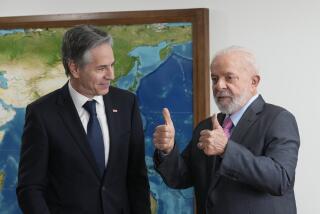Brazil President-Elect Cardoso Promises Reform : Latin America: Health, education and agriculture will be priorities, he says. But he omits specifics.
- Share via
SAO PAULO, Brazil — Long on rhetoric but short on specifics, President-elect Fernando Henrique Cardoso came out of post-election hiding Thursday to tell the nation that education, health and agriculture will be priorities during his four-year tenure and to hint that he may reduce the huge federal bureaucracy.
“Public workers are supposed to serve the public,” Cardoso, 63, said during a nationally televised news conference from Brasilia, the nation’s capital. “If they’re not serving the public, their jobs will be eliminated.”
Cardoso, who declared himself the winner over eight other candidates, had vanished into the interior of his home state of Sao Paulo after casting his ballot in Monday’s elections. Even President Clinton had been unable to find the next leader of the world’s third-largest democracy for a word of congratulation.
Unofficial results show that the centrist Cardoso, a former college professor, senator and ambassador to the United States, took 54% of the more than 94 million votes cast--apparently on the basis of an economic plan he developed as finance minister earlier this year to halt Brazil’s decade-long inflation spiral. Since the introduction of the plan in July, inflation fell from 50% a month to less than 1% in August.
Cardoso, once exiled by the military for his left-wing views, vows to use free-market forces to narrow the gap between rich and poor in the world’s 10th-largest economy, where more than half of the nation earns less than $120 a month.
Cardoso said he will push further with reforms to keep the country’s anti-inflation program on track.
But Cardoso, who as finance minister sought revision of the constitution to allow greater privatization, shied away from specifics about his controversial promises to sell off certain government-controlled industries whose proceeds could be used to help bridge the country’s budget deficit.
“I am committed to privatization,” he said, “but we will sell (government agencies) when it is beneficial to Brazil.”
He promised that the country will not sell Petrobas, the mammoth and highly profitable state oil and gas company, though he said he favored joint ventures for the firm with private industry.
His primary message, however, was the need for health and education reforms.
“The question of education is fundamental,” Cardoso said. “Brazil followed the opposite model to Asian countries. We concentrated education in the (upper) class. We didn’t generalize it for most of the population. Right now, it’s embarrassing what we pay our teachers.”
Schoolteachers in Brazil earn less than $300 a month.
With the country enjoying a degree of economic stability for the first time in nearly 20 years, Cardoso said, Brazil can begin to implement the programs needed to narrow the income gap.
“It doesn’t matter whether a program is popular or not,” he said. “The question is whether it works. If it works, we’ll do it. I am entering into this body and soul.”
Cardoso’s address was upbeat and diplomatic.
“The main message was that ‘I’m the one in charge,’ ” said Walder de Goes, president of the Brazilian Institute of Political Studies.
But analysts said Cardoso skirted harsh political realities by focusing on sweeping pronouncements without presenting details that might offend some factions.
“Saying you’re for better education and better health is like saying you’re in favor of spring,” said Alexandre Barros, president of Early Warning Consulting, a political risk analysis firm based in Brasilia. “Who’s for keeping people illiterate and in bad health? . . . The question is, ‘What are you going to do to accomplish those goals?’
Cardoso may have been tentative, analysts said, because he does not yet know how to respond to pressures from competing factions inside the diverse coalition he molded in order to win the election.
Top politicians who backed Cardoso’s candidacy told reporters that they were expecting prominent Cabinet posts for their associates.
A powerful leader of the rightist Liberal Front Party, or PFL, Antonio Carlos Magalhaes, told reporters that he wants to see people from his home state of Bahia in “prominent places” in the new government, which takes office Jan. 1.
The governor-elect of Minas Gerais state, centrist Helio Costa, said he is counting on at least three Cabinet posts for his people.
Complicating matters, Cardoso must maneuver his programs through a troublesome Congress, which has been an almost unmanageable assembly of 19 parties tinged by scandal and devoted more to regional bosses and personal interests than to solving urgent national problems.
More to Read
Sign up for Essential California
The most important California stories and recommendations in your inbox every morning.
You may occasionally receive promotional content from the Los Angeles Times.










